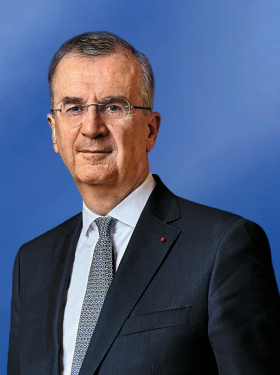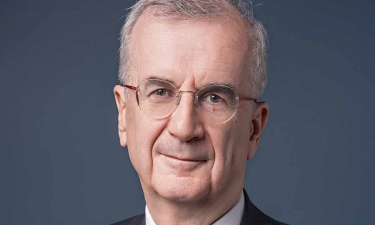- Home
- Governor's speeches
- Forging a successful alliance between in...
Forging a successful alliance between innovators and regulators

François Villeroy de Galhau, Governor of the Banque de France
Published on 14th of October 2024

ACPR-AMF Fintech Forum – Paris, 14 October 2024
Speech by François Villeroy de Galhau,
Governor of the Banque de France
Chairman of the ACPR
Ladies and Gentlemen,
I am delighted to welcome you to the Banque de France for this fifth annual Fintech Forum, organised jointly by the ACPR and AMF. I would like to extend a warm welcome to Marie-Anne Barbat-Layani, Chair of the AMF, and to thank Clara Chappaz, Secretary of State for Artificial Intelligence and Digital Technologies, for her presence at the close of this morning's proceedings. We created this Forum with a simple aim: to show that the Banque de France, and our Authorities, are as much those of the fintechs as they are of the incumbent players, and that innovation and regulation do not necessarily constitute an odd couple.
Today I would like to illustrate this with a continuity, a break with the past, and a challenge. First, the continuity: while the first few months of 2024 have witnessed a stabilisation of the amount of funds raised, the ACPR and the Banque de France remain resolutely committed to fintechs (I). The break with the past concerns the surge in artificial intelligence: the ACPR stands ready to assume the role of “market supervisor” for the French financial sector (II). Lastly, the challenge is one of balancing openness and trust: as from next January, DORA legislation will provide more trust – as well as more requirements (III).
I. Continuity: the commitment of the Banque de France and the ACPR to the innovative ecosystem
1. A stabilising financial environment
After the heady years of 2021 and 2022, followed by a sharp downturn in 2023,i funds raised by French fintechs stabilised in the first half of 2024 at EUR 560 million, compared with EUR 568 million in the first half of 2023.ii Therefore France is still the EU's biggest market, ahead of Germany (nearly EUR 500 million), but continues to lag well behind the United Kingdom (EUR 1.3 billion). This stabilisation is due in particular to the shift in monetary policy: the last increase in key rates was in September 2023, and since then we have cut rates twice by 25 basis points, in June and September, as a result of the sharp fall in inflation. I will refrain from saying any more as we are in a “silent period”.
The first half of the year may therefore mark a turning point and herald renewed growth in the fintech ecosystem. We are also witnessing this at the ACPR's Fintech Innovation Hub, with a distinct upturn in the number of new projects. By mid-September, 72 projects had been submitted, an increase of around 15% on the same period in 2023.
2. The ACPR continues to listen closely to the ecosystem and intends to adapt to its developments
Against a backdrop still fraught with economic uncertainty, the ACPR is listening ever more closely to the ecosystem. This is what the Fintech Forum is all about, together with the “My Fintech Journey” website, which is regularly enhanced to provide clear answers to the main questions posed by project leaders. It is also the purpose of our commitments under the Fintech Charter, and their regular monitoring.
Our first contact response rate within two weeks – as outlined in the Charter – remains very high at 92%. Once the authorisation journey has actually begun, response times have edged up this year, averaging around 11 days (compared with 10 last year). The ACPR has also been very proactive around innovative projects in the broadest sense. In particular, I should mention the projects involving the first two issuers of stablecoins accredited in France – and in Europe – on 1 July, the same day that the MiCA Regulationiii came into force. We are also currently vetting applications for the pilot regime.iv
Lastly, for fintechs that have already been granted authorisation and wish to extend their activities to other European countries, we are aware of the difficulties arising from the increasing number of sometimes relatively similar reports that need to be submitted to different authorities, and differing interpretations of regulations. These disparities are generating complexity and significant costs for start-ups like fintechs. And let me say loud and clear that it is time to take serious note of the call of the Draghi Report, among others, for more standardisation and simplification. We fully intend to contribute to this process.
II. A break with the past, around artificial intelligence
1. One of the main drivers of fintech innovation
Artificial intelligence (AI) – and especially generative AI – has clearly made exponential progress over the past two years. And despite massive interest, we have not yet collectively grasped the full extent of the transformation to come. Let's be humble enough to admit that we don't know everything, and that we don't really know what the business models of tomorrow will look like. But in the case of AI, if we wait until we are sure before innovating, we will be sure to get it wrong.
As a central bank and financial supervisor, it is imperative that we keep up with these developments; and learning by doing is critical. At the Banque de France, we have already given priority to five use cases. At the beginning of May, I outlined an “AI doctrine”v at the BIS, organised around three guiding principles: understand and master; buy-in, through a “human AI” that enhances human capabilities rather than replacing them; and cooperation between public authorities.
2. The ACPR stands ready to take on the role of market supervisor
In this regard, the European legislation adopted last June,vi designed to promote trustworthy AI, will gradually enter into force. It identifies two “high-risk” use cases in the banking and insurance sectors: systems designed to assess the creditworthiness of individuals or assign them a credit rating; and systems for assessing and pricing life and health insurance products.
The ACPR stands ready to assume the role of market supervisor for the French financial sector. This designation seems only natural, in phase with both the spirit of the regulation that explicitly provides for such a role, and with what almost all of our European neighbours intend to do: the supervision of these systems can unlock significant and fairly obvious synergies with the prudential supervision of banks and insurers. And we have been preparing for this role for several years now, in liaison with the marketvii and with the support of the Banque de France's Lab (our Open Innovation centre).
So we have already acquired expertise, especially in auditing algorithms; however, we recognise that this role will require a certain methodological leap for the designated national authorities. Developing a standard European methodology would make sense in this regard, based on guidance from the European supervisory authorities, for example.
III. The challenge: balancing openness with trust in the digital arena
1. Open source, open data... new models to serve consumers
New digital uses have resulted in new models that benefit consumers. Open source, open data, and so on: the desire for openness resides in the name. European regulation has helped to drive this dynamic, the second Payment Services Directive (PSD 2) being a prime example.viii
For financial services, this openness is set to intensify in the near future with the draft Financial Data Access regulation (FIDA). ix A gradual approach to openness and data sharing – contingent on the degree of standardisation and digitisation – should enable existing players and fintechs to reach a consensus and jointly develop guidelines and technical arrangements for sharing, while avoiding the risks of exclusion and demutualisation. This should be done as part of “schemes”, outside of which data sharing should not be possible, and access to which should be restricted to entities established within the EU. It is in nobody's interest for openness to turn into anarchy, or to exacerbate cyber risks.
2. In a more open world, more prone to cyber risk, a major component of systemic trust: DORA
BigTechs have established a dominant position in the IT sphere in areas such as the cloud, to which the financial sector is increasingly turning. x By the way, the ACPR has published just today a study on this topicxi and possible regulatory responses. Faced with these dominant players, fintechs are even more welcome as factors that “dilute” risks. Speaking more generally, it is obvious that cyber risks are growing in line with the increasing “interconnectedness” of the digital sphere – and even more so with rising geopolitical tensions.
The EU regulation concerning digital operational resilience for the financial sector (DORA), due to be applied from next January, will enable the three European authorities to directly oversee all critical IT service providers. I would like to take this opportunity to welcome the recent appointment of Marc Andries, Inspector General of the Banque de France and a recognised expert in IT and cybersecurity, to head up this new mission. DORA will provide a major component of systemic trust thanks to a state-of-the-art regulatory framework. It bolsters third-party risk management and incident reporting for more effective cyber threat analysis, introduces mandatory penetration testing, and fosters a collective defence culture by enabling financial entities to exchange information on cyber threats within trust-based communities. DORA's rigorous standards provide a guarantee of the increased resilience it will bring to the financial sector. It is therefore particularly important that all those involved are well prepared and this afternoon's thematic workshop, run by teams from the ACPR and the AMF, will provide all those concerned with answers to any questions they may have.
I will conclude with a quote from Benjamin Franklin: “There are many ways not to succeed, but the surest way is never to take risks.” Fintechs know well how to take risks and in doing so, they also enable the financial sector as a whole to innovate and adapt to technological change. Nevertheless, dangers relating to these changes must be known and controlled, so we also need to forge a successful alliance between innovators and regulators. You can count on our commitment to this objective. Thank you for your attention.
i Villeroy de Galhau (F.), Fintechs: at the forefront of “new frontiers”, opening address of the 4th ACPR-AMF Fintech Forum – Paris, 16 October 2023.
ii France Fintech, Half-yearly Report, 2024
iiiEurope's Markets in Crypto-Assets (MiCA) Regulation
iv EU Regulation of 30 May 2022 setting up a pilot regime for market infrastructures based on distributed ledger technology.
v Villeroy de Galhau (F.), Innovation by central banks: the sooner the better, speech delivered at the BIS Innovation Summit – 6 May 2024
vi EU AI Act
vii Through workshops organised with banks and insurers, techsprints that bring together fintechs, data scientists and more traditional players, and research.
viii Directive (EU) 2015/2366 relating to payment services.
ix Framework for financial data access, (FIDA)
x Villeroy de Galhau (F.), Big techs in finance: a bildungsroman that is far from over, speech at the BIS conference, 9 February 2023.
xi The growth of big techs in the financial sector: which risks, which regulatory responses?, ACPR study published on 14 October 2024.
Download the full publication
Updated on the 14th of October 2024